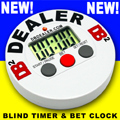|
|
Poker League Points SystemsPoker Leagues This page describes the different types of points systems for a poker league. Jump to the Dr. Neau's Tournament Formula section of this page for my recommendation on how you should set up a scoring system for your poker league. Visit the Poker League Rules & Points Systems forum for discussion about how to set up a poker league and various poker league points systems and formats. Payout Structure Points SystemA very simple poker league scoring system is to award points at the same payout rate (%) that you award the purse to each games winner(s). If your payout structure is 50/30/20 (50% of the payout goes to the winner of your tournament, 30% goes to second place, and 20% goes to third place) then award league points at that same rate - the winner gets 50 league points, second place gets 30 points and third place gets 20 points. Add up all the league points at the end of the year to determine your overall league winner. I recommend that you DO NOT use this type of points system. A very similar, but only slightly better, system is to award points based on your payout dollar amounts. If we use the same 50/30/20 payout structure that we used in the previous example and the total payout for your game was $300, the winner is awarded 150 league points ($300 x 50%), second place is award 90 league points ($300 x 30%), and third place is awarded 60 points ($300 x 30%). This system is slightly better than the first example because the league points awarded will increase/decrease based on the number of players in your games. It is harder to win a game with 30 players than it is to win a game with 10 players and your league points should reflect this. But once again, I recommend that you DO NOT use this type of points system. Linear Points SystemOne of the easiest and most popular poker tournament points systems is to award one point for each player in the tournament. In a 20 player tournament, first place gets 20 league points, second place gets 19 points, third place gets 18 points ... all the way down to the last place player who only earns 1 league point. The more players in the tournament, the more points the winners will be awarded. I recommend that you DO NOT use this type of points system. Using this method, you could also award extra points for winning each tournament. You could award the winner an extra 5 points for winning the game with second and third place earning 3 and 2 points. You could also award league points for busting out players or making the final table. For example, you might want to award 2 points to each player who eliminates another player or you might want to award 5 points for making the final table. If you find that the same players have a tendency to win every tournament, you can award a player an extra 2 points for eliminating any player who made the final table at the previous tournament and/or you can award 5 points for eliminating the previous tournament's winner. The points possibilities are endless and may be used to improve and/or bring excitement to your game! I recommend that you DO NOT use this type of points system. Proportional Points SystemA proportional points system is similar to a linear system but awards a certain number of points in proportion to the total number of players in the tournament. You might award 100 points to the winner(s) of a tournament of 1-10 players, 200 points to the winner(s) of a tournament of 11-20 players, 300 points to the winner(s) of a tournament of 21-30 players, etc.. I recommend that you DO NOT use this type of points system. Similarly, you can allocate 100 points for each player in attendance at the tournament and then divide the total points amongst the winners. A tournament of 17 players would result in a total points purse of 1,700 with the winner receiving 50% of the total points, 2nd place receiving 30% of the total points, and 3rd place receiving 20% of the total points. Points System Based On a FormulaThe best method to award points for a poker league is to use a mathematical formula. That formula should account for various factors such as the number of players in each game, the buyin cost for each game, and the player's finish in each game. It is more of an accomplishment to win a game of 50 players than it is to win a game of 10 players and it is more of an accomplishment to win a game with a $500 buyin than to win a game with a $5 buyin. A lot of time and effort can go into devising an appropriate formula for awarding points to players in your home poker league. Here is my suggested formula that is explained below ... score = SQRT (n * b * b / e) / (f + 1.0) Sounds simple, right? Don't let it scare you off just yet! Championship Game or Season Points Total?There are several ways that you can determine your league champion - the player with the most league points at the end of the season, or the winner of the championship game at the end of the season, or a combination of the two. The best method might be to determine the overall points champion after a championship game is held. The top players in your league all earn a seat at the championship game and then your overall league winner is determined by the player with the most league points after that championship game. Not having a championship game might encourage players with low points to exit your league and not show up for your games. If too much money is taken from each individual game and awarded to the league winners, or to the championship game, players with low league points might stop playing in your games half way through your season! Their thinking would be that they no chance to win the championship so why should they contribute money every week to that championship game! Other Factors to ConsiderYou do not want to use a poker league points system that drives players out of your league because they have no chance of winning the league or getting to the championship game at the end of the season. You probably want to use a points system that will allow a low-scoring player to make a comeback towards the end of the season and still earn a spot at the championship game. A player with low league points who has no chance of winning the league might stop showing up at your games unless you have a rule that every player who wins an individual tournament is eligible for your championship game - a player with low overall league points might still show up for every game in the hope of winning a tournament to earn him a spot at the championship game. Do you really want to start a league? Why not just play each tournament on its own and allow the money awarded from each individual game to determine the overall winner? What if a player misses a game or two? Does this make it impossible for that player to earn a seat in the championship game? One method to alleviate this problem is to allow a player to drop their lowest score(s). Alternatively, you might not want to do this because you want a system that encourages every player to show up at every game. But you probably want a mixture of the two ... a points system that awards good play but allows a player to be absent for a game, or maybe even two games. It all depends on the type of league that you want to run and how reliable your players' attendance is. Running a league and holding back money for a league champion might cause legal problems because all money paid in will not be paid out every game. What was once a perfectly legal game (all money paid in is paid out) might become illegal if you withhold money for a championship game or for your league winner. Keep legal considerations in mind when setting up your league. My Recommendations ...I recommend that you either not run a league ... or make it fairly easy to earn a seat at the championship game. You don't want players dropping out of your home games because too much money goes to the league champion and they have no chance of winning that championship. You want players who play poorly to keep coming out to your games! Don't give them a good reason to stop coming to your games. You also want occasional players to attend your games. Do not use a linear-based point system, use a formula to award league points. Use Dr. Neau's Tournament Formula for your poker league. Award league money to the player who wins your regular season ... but also hold a championship game with a prize big enough to make winning the championship game worthwhile. You might want to award half your league prize money to the winner of the regular season and half of your money to the winner of the championship game. Allow players to drop their lowest score(s) - this will help solve the problem of a player missing a game or two during your season. Allow players to avoid having to contribute money towards your league. This will allow 'occasional' players to come to your games without them having to contribute money towards a league championship that they know they will not (or cannot) attend. Do not hold back (league champion) money from individual games if this might make your game illegal due to the fact that you will be collecting more money than you pay out every game. Sure, you might be able to convince a court judge that you will eventually pay out all money by the end of the year, but you might want to avoid this problem altogether. Dr. Neau's Tournament FormulaOne of the most popular poker league points systems is Dr. Neau's Tournament Formula. Visit the Dr. Neau's Tournament Formula topic in the HPT Forums for more information about this poker league points system that takes into account the number of participants in the tournament, the buy-in cost, the individual player's total expense (buy-ins + add-ons + rebuys), and the individual player's finish. This section is Dr. Neau's explanation of his formula and why you should use it. 
The Formulascore = SQRT (n * b * b / e) / (f + 1.0)
OriginsI started running tournaments in January, 2004. From then until July, 2005, my friend and I hosted 12 tournaments. They ranged in size (6 players to 17 players), buy-in cost ($30 to $60), rebuys (some tournaments allowed none while others allowed multiple) and add-ons (some tournaments allowed none while others allowed a small bump before the first break). People would often ask "Who is the best player?" I found that a pretty difficult question to answer ...
The Guiding Principles
Inventing the Formula - Factors to ConsiderIn August, 2005, we decided it was time to start a league. We planned 6 tournaments over the next 6 months with a final championship that would consist of the top players throughout the season. I did a lot assessing of various formulas that I could find (if I remember, some of those included WSOP, Card Player, WPT, etc.) I read various articles from pros on what they thought the qualities of a good point system were. Based on all of that information, my experience trying to assess the best player from our tournaments and the fact that we needed to choose the players for a championship, I looked at the factors I wanted my system to take into account ...
Inventing the Formula - Weighting the FactorsOnce I had those identified, I had to decide how to weight them. I looked at each individually ...
So I knew about what I needed to do, but I still had a question to answer: What does the first person out get? Some options ...
So we're left with everyone gets at least something. But now think about this: Does the first person out in a 100-player tournament deserve the same points as the first person out in a 10-player tournament or a 5-player tournament? That one was tough to answer, but I decided that, on average, someone who consistently goes out first in a 100-player tournament probably sucks a little more. So, again ... decelerating curve. So, let's take a look at the formula again ... score = SQRT (n * b * b / e) / (f + 1.0)
Having size ("n"), cost ("b") and profitability ("b / e") inside the square root function gives us that nice decelerating curve I wanted for these factors. Dividing by the finishing position ("f") gives us that nice accelerating curve I wanted. I added the "+ 1.0" to make it a little less drastic. League ConsiderationsSince this was within the context of a league where we were trying to decide who got to play in the championship, it is probably worth mentioning a few other points that had more to do with how someone's total score for the season was calculated.
A Little More History
So we started using this formula for our league in September of 2005. I incorporated it into my software as an optional formula for people to use. It started popping up on HPT in various threads over time (first mention I can find is WedgeRock in December of 2005 saying he's using it). It's actually been quite amusing over the last 7 years to see that life that it has taken on and how polarizing it can be. And I do sometimes think about the fact that after I'm gone, the one lasting legacy outside my family will probably be this formula. How long will it live? Putting It To WorkAs well as running a league for the last 8 years, I've participated in a few others. It really drives me nuts when the league manager is slow to get information out about tournament results, league standings, etc. I've really made an effort with my league to keep people as up to date as possible. I send an email the next morning with results and current standings. I update the website at the same time. In the invites, I always make sure to include a link to the website where the results, standings and point calculator are. Doing all of this can be a lot of work if you are doing it by hand or having to retype a lot of information into a spreadsheet. To that end, I've put a lot of effort into my software, Dr. Neau's Tournament Manager, so that it does a lot of the work for me. Editor's NoteThis poker league points system has been generously provided by Dr. Neau and is included in his excellent Dr. Neau's Tournament Manager. This article was written by Dr. Neau and is used with his permission. Feel free to quote from this article but please mention the good doctor's name and link to his website. Visit the
Dr. Neau's Tournament Formula topic
in the HPT Forums for discussion about this formula. HPT Forums Links
HomePokerTourney Poker League Rules & Points Systems Forum More HPT Forums Links
Cash Game Points Links
Poker School Online How Do You get Your Own Points System Posted On This Page?The first thing you must do is post your points system in my Poker League Rules & Point Systems forum. After much thought and consideration (and comments from the peanut gallery!) I just might add your points system to this page. |
Online Poker Guide
Hand Converter
Holdem strategy
Freeroll tournaments
Poker calculator
Online poker
Poker rooms
> poker pokeren
> iDeal poker
> online casino
> iDeal casino
> casino casinos
> casino bonus
Get Bonus code Titan Poker, and full tilt poker referral code or max bonus to the full tilt referral code. Best ultimate bet referral code sign up bonus doyles room promo code or poker host bonus code























